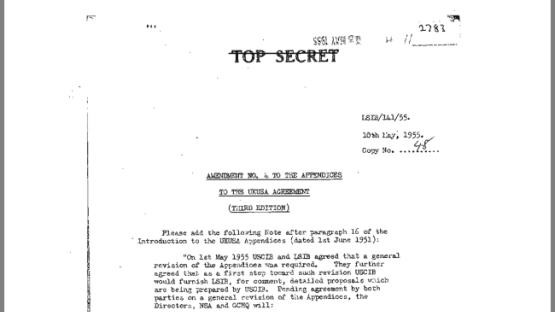Privacy International Files Lawsuit To Compel Disclosure Of Secretive 1946 Surveillance Agreement

Privacy International has filed a federal lawsuit seeking to compel disclosure of records relating to a 1946 surveillance agreement between the US, UK, Australia, Canada and New Zealand, known as the “Five Eyes alliance”.* We are represented by Yale Law School’s Media Freedom and Information Access Clinic (MFIA). The most recent publicly available version of the Five Eyes surveillance agreement dates from 1955. Our complaint was filed before the U.S. District Court for the District of Columbia.
Key points
- For years, PI has tried to obtain information about the agreement and the rules governing the Five Eyes alliance via freedom of information requests and other methods.
- The 1955 version of the agreement provides that all Five Eyes countries shall exchange by default all signals intelligence they gather, as well as methods and techniques related to signals intelligence operations.
- In the US, PI has made freedom of information requests to the National Security Agency, the Office of the Director of National Intelligence, the State Department, and the National Archives and Records Administration. All four agencies are subject to the Freedom of Information Act and all agencies have withheld the records PI seeks.
- Our complaint seeks to compel disclosure of the current version of the agreement and records relating to the rules governing the government’s exchange of intelligence with the other members of the Five Eyes alliance.
- PI is seeking the agreement’s legal standards and limitations, not operational details.
Scarlet Kim, PI legal officer said:
“For years, Privacy International has fought to shed light on the closely integrated relationship between the intelligence agencies of the Five Eyes alliance. Yet key documents, including the current agreement, remain secret, despite being critical to proper scrutiny of US surveillance activities. The public has a right to know what rules govern the exchange of information – which may include purely domestic communications and data – through this private pact.”
Hannah Bloch-Wehba, Stanton First Amendment Fellow at MFIA said:
“Without knowing the procedures and rules that govern intelligence sharing among the Five Eyes, it is impossible for the public to know if this secretive surveillance abides by constitutional restrictions. Disclosure of the laws, rules, and regulations that constrain government surveillance is fundamental to basic democratic oversight. The government’s failure to make available even the most basic information about the rules currently in place corrodes public confidence in the rule of law and undermines our democracy.”
Our FOIA correspondence
the Office of the Director of National Intelligence
the National Archives and Records Administration
Notes to editors
*The Five Eyes alliance is a secretive, global surveillance arrangement between the US, UK, Australia, Canada and New Zealand. The origins of the Five Eyes alliance stretch back to World War II, when the military branches of each country respectively developed signals intelligence relationships with their counterparts. Those relationships were formalized in the United Kingdom-United States Communication Intelligence Agreement, signed in 1946.
The most recent version of the agreement to have been made public is from 1955 (63 years ago). That version provides for the exchange by default of all raw signals intelligence between the countries, as well as of the methods and techniques related to signals intelligence operations.
Technology has vastly changed since 1955, and so have governments’ methods of conducting surveillance. We now have cell phones, fitbits, and Google, all of which have facilitated the increase of data (by orders of magnitude) collected about us. How communications travel has also changed, enormously increasing opportunities for foreign governments to capture even purely domestic communications.